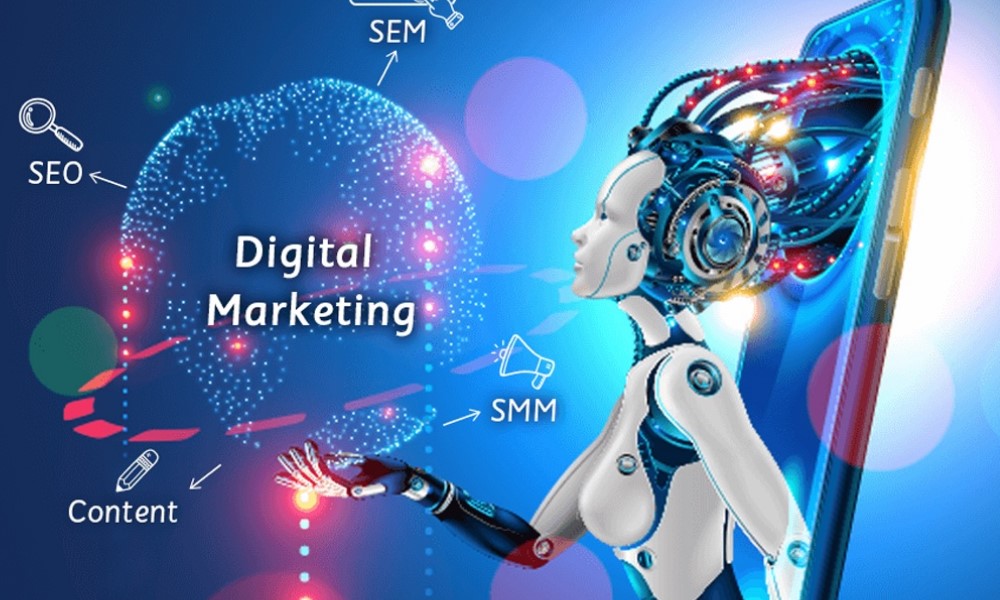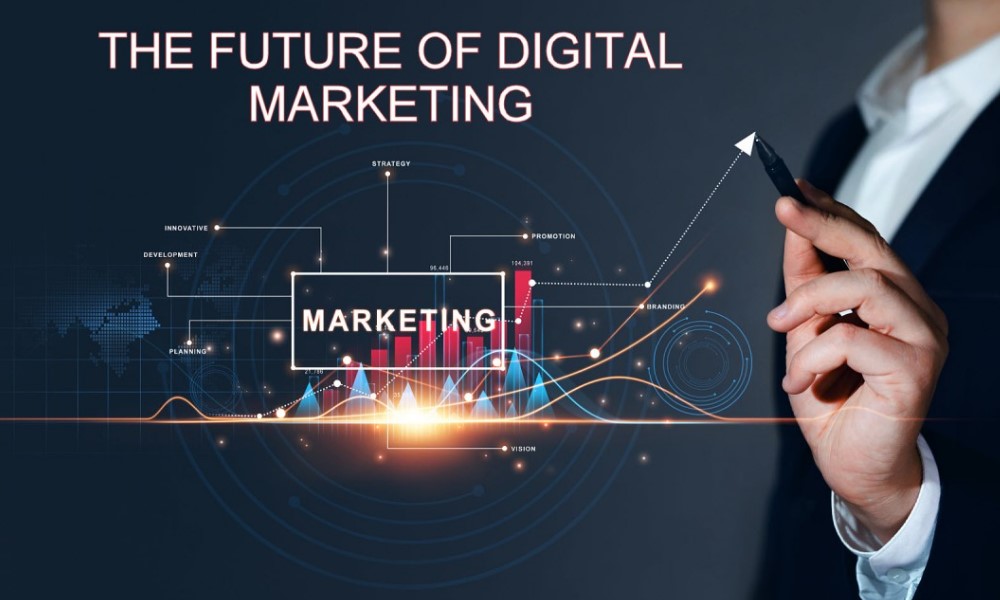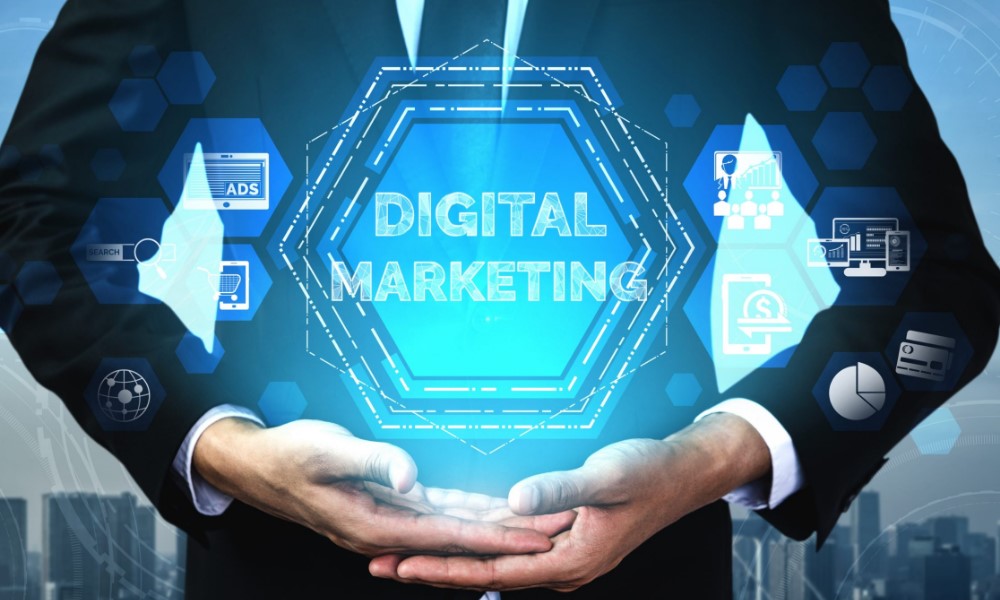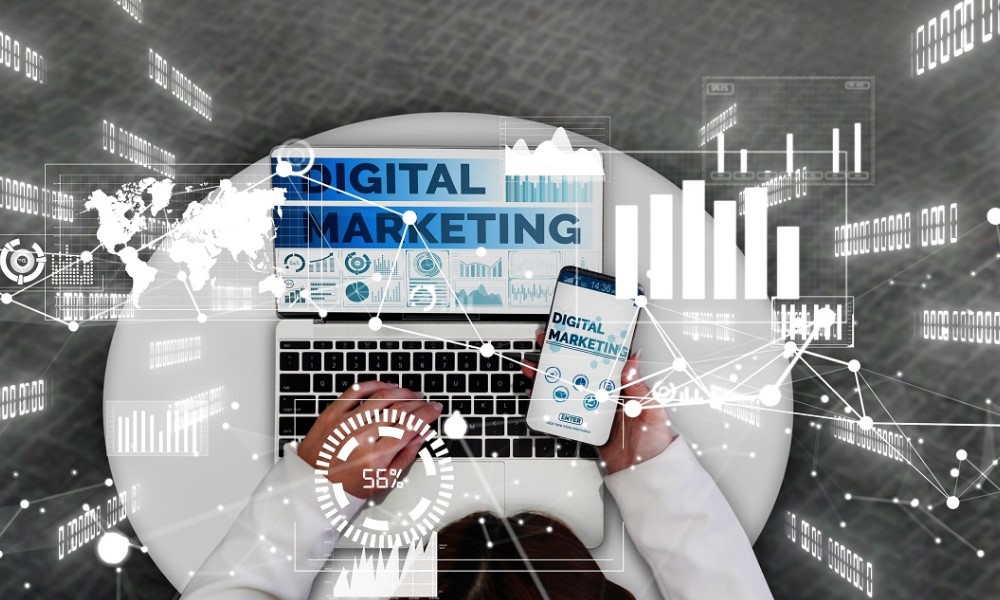The Future of Digital Marketing: Strategies for Business Growth
In today’s hyper-connected world, the future of digital marketing is more critical than ever for businesses aiming to achieve sustained growth. Digital marketing has transformed from being an optional strategy to a necessity in nearly every industry. With more consumers spending significant time online, the digital landscape provides unprecedented opportunities for businesses to connect with their target audience.
Why Digital Marketing is Essential for Business Growth

The digital age has fundamentally changed how businesses operate and how customers interact with brands.
Traditional marketing channels like print and TV ads are no longer sufficient to reach modern consumers, who expect brands to be present online and offer personalized, real-time engagement.
Key Benefits of Digital Marketing

- Global Reach: Unlike traditional marketing methods, digital marketing allows businesses to reach audiences on a global scale. Even small businesses can access international markets through well-targeted digital campaigns.
- Measurable Results: One of the most significant advantages of digital marketing is the ability to track and measure campaign performance in real-time. Marketers can quickly see what’s working, optimize their strategies, and improve ROI.
- Cost-Effectiveness: Compared to traditional marketing methods, digital marketing is more affordable. Businesses can run highly targeted campaigns at a fraction of the cost of TV or print ads, making it accessible to small and medium enterprises (SMEs).
- Personalization: With digital marketing, businesses can collect valuable data about customer preferences and behavior, allowing for highly personalized content and offers that increase engagement and conversions.
Key Digital Marketing Strategies for 2024

As we look toward 2024, the digital marketing landscape continues to evolve rapidly. Businesses must adapt to stay competitive and capitalize on emerging trends. Here are the key digital marketing strategies that will drive business growth in the upcoming year:
1. Search Engine Optimization (SEO)
SEO remains at the core of successful digital marketing strategies. With Google’s algorithm becoming more sophisticated, businesses must focus on creating high-quality, relevant content optimized for search engines. In 2024, expect even greater emphasis on AI-driven search and voice search optimization, with more consumers using smart devices like Alexa and Google Assistant.
Additionally, user experience (UX) and mobile-first indexing will continue to play a crucial role in determining website rankings. For businesses, investing in SEO tools like SEMrush or Ahrefs is essential for staying competitive.
2. Content Marketing
High-quality content continues to be a powerful tool for engaging audiences and building brand authority. In 2024, interactive content such as quizzes, polls, and personalized experiences will become more prevalent, as it offers a dynamic way to engage users. Video content remains crucial, with short-form videos on platforms like TikTok and Instagram Reels driving high engagement.
Businesses should also focus on long-form, value-driven content that educates and provides actionable insights. Content marketing platforms like HubSpot are invaluable for managing content strategies and automating workflows.
3. Social Media Marketing
Social media platforms are constantly evolving, and in 2024, they will continue to be a primary channel for customer engagement. The shift toward social commerce will grow stronger, with platforms like Instagram and TikTok offering integrated shopping experiences.
Brands will need to focus on creating authentic, community-driven content to build trust and foster long-term relationships with their audience. Tools like Hootsuite can help businesses manage multiple platforms, schedule posts, and analyze engagement metrics to optimize their social media efforts.
4. Email Marketing
Email marketing remains one of the most cost-effective strategies, delivering high ROI. In 2024, personalization and automation will be key drivers of email marketing success. Segmented email campaigns based on user behavior will help businesses send relevant messages at the right time.
Tools like Mailchimp offer robust automation features, allowing businesses to streamline their email efforts and improve customer retention.
5. Artificial Intelligence and Machine Learning
AI and machine learning are transforming digital marketing by offering personalization at scale. From AI-powered chatbots to predictive analytics, businesses can deliver tailored experiences that meet customers’ needs more effectively.
Top Digital Marketing Strategies for 2024

1. Search Engine Optimization (SEO)
SEO is the backbone of digital marketing. With search engines like Google processing billions of searches every day, it is critical for businesses to optimize their websites for search visibility. By using strategic keywords, creating high-quality content, and ensuring a user-friendly site experience, businesses can drive organic traffic to their websites.
- Detailed Explanation: SEO involves multiple techniques such as on-page optimization (e.g., meta tags, alt texts, and keyword usage), off-page optimization (e.g., backlinks from reputable websites), and technical SEO (e.g., website speed, mobile optimization). Together, these efforts improve your website’s search engine rankings, making it easier for potential customers to find your business.
- Benefits:
- Increases organic traffic without ongoing ad costs.
- Boosts credibility and trust with search engines.
- Delivers long-term results compared to paid ads.
- Transactional Insight: To enhance your SEO efforts, consider investing in tools like SEMrush or Ahrefs, which offer advanced SEO insights and optimization strategies. SEMrush starts at $119.95/month and provides detailed keyword tracking, site audit tools, and competitive analysis to improve your rankings.
2. Content Marketing
Content marketing is the art of creating valuable, relevant content to attract and engage your target audience. Whether it’s blogs, articles, infographics, podcasts, or videos, content marketing helps establish your business as an authority in your industry.
- Detailed Explanation: Content marketing not only drives traffic but also builds long-term relationships with your audience by offering them valuable information. Quality content can lead to higher engagement rates, lower bounce rates, and better conversions. Businesses that consistently publish insightful content are more likely to rank higher on search engines.
- Benefits:
- Builds trust and authority in your niche.
- Increases website traffic over time.
- Improves customer retention through useful, engaging content.
- Transactional Insight: Tools like HubSpot can help streamline content creation, scheduling, and analytics. HubSpot’s all-in-one platform, starting at $45/month, includes content management tools, SEO optimization, and marketing automation to help businesses grow their content strategy efficiently.
3. Social Media Marketing
Social media is one of the most powerful tools for engaging with customers, promoting brand awareness, and driving traffic. With billions of people using platforms like Facebook, Instagram, and LinkedIn, businesses can use paid ads and organic posts to reach highly targeted audiences.
- Detailed Explanation: Social media marketing involves more than just posting updates. It includes carefully curated content, customer engagement, social listening, influencer collaborations, and paid social advertising. For businesses, having a strong presence across relevant social media channels is essential for brand visibility and trust.
- Benefits:
- Helps build a community around your brand.
- Offers direct engagement with customers.
- Provides targeted advertising options with advanced audience segmentation.
- Transactional Insight: Social media management platforms like Hootsuite ($19/month) allow businesses to schedule posts, track performance, and analyze engagement metrics across multiple platforms. Hootsuite makes it easier to plan and execute an effective social media strategy that drives results.
4. Email Marketing
Email marketing remains one of the most effective ways to nurture leads, keep customers engaged, and drive repeat business. With an average ROI of $42 for every dollar spent, email marketing should be a central part of your digital strategy.
- Detailed Explanation: Email marketing allows businesses to send personalized, targeted messages directly to customers’ inboxes. From newsletters and promotional offers to onboarding emails and product updates, email campaigns help businesses maintain regular communication with their audience, increasing loyalty and conversions.
- Benefits:
- High return on investment (ROI).
- Direct access to your audience’s inbox.
- Ability to segment audiences for personalized content.
- Transactional Insight: Platforms like Mailchimp (free for up to 2,000 subscribers, with premium plans starting at $9.99/month) offer easy-to-use tools for creating, sending, and tracking email campaigns. Businesses can use Mailchimp’s automation features to send targeted emails based on customer actions.
5. Pay-Per-Click (PPC) Advertising
PPC advertising is a digital marketing model where advertisers pay a fee each time one of their ads is clicked. It’s a quick and efficient way to get your business in front of potential customers, especially those searching for your products or services.
- Detailed Explanation: PPC can be a powerful tool for generating leads and driving conversions, especially for businesses looking for immediate results. By bidding on keywords related to your industry, your ads appear at the top of search engine results, increasing your visibility. However, PPC requires careful management to ensure you’re targeting the right audience at the right cost.
- Benefits:
- Quick results with immediate traffic.
- Highly targeted advertising based on user search intent.
- Measurable and controllable costs.
- Transactional Insight: Tools like Google Ads provide businesses with detailed insights into their ad performance, allowing them to optimize campaigns for better results. PPC platforms generally allow you to set your budget, with costs varying based on keywords and competition.
Top Digital Marketing Tools for 2024

To implement these strategies effectively, businesses need reliable tools that offer insights, automation, and optimization capabilities. Below is a breakdown of the top digital marketing tools you can use to grow your business:
| Tool | Price | Best For | Key Features | Advantages | Disadvantages |
|---|---|---|---|---|---|
| SEMrush | $119.95/month | SEO & PPC | Keyword research, site audit, competitive analysis | Comprehensive SEO toolkit, user-friendly interface | Expensive for small businesses |
| HubSpot | Free – $45/month | Inbound marketing | CRM, marketing automation, content management | Scalable, robust analytics, free CRM | Premium features are costly |
| Hootsuite | $19/month | Social media management | Scheduling, content calendar, analytics | Supports multiple platforms, time-saving features | Limited features in basic plans |
| Mailchimp | Free – $9.99/month | Email marketing | Automation, analytics, A/B testing | Affordable, easy to use, good for small businesses | Limited functionality in free plan |
| Google Analytics | Free | Website analytics | Real-time reporting, conversion tracking | Free, detailed insights, integrates with Google Ads | Complex for beginners |
Real-World Use Cases and Product Comparisons
1. SEMrush
SEMrush is ideal for businesses looking to improve their SEO rankings and stay ahead of the competition. It provides tools for keyword research, site audits, and competitive analysis.
- Use Case: A small e-commerce store wants to improve its search engine visibility. By using SEMrush, the store can track keyword rankings and identify areas for SEO improvement, leading to increased organic traffic.
2. HubSpot
HubSpot is perfect for businesses seeking a comprehensive inbound marketing solution. It helps manage content, leads, and customer relationships in one place.
- Use Case: A growing B2B company uses HubSpot to automate its email marketing and manage customer relationships, saving time and improving lead nurturing.
3. Hootsuite
Hootsuite is a must-have for businesses with active social media strategies. It allows teams to schedule posts, track engagement, and analyze social performance.
- Use Case: A fashion brand uses Hootsuite to schedule Instagram and Facebook posts, tracking engagement metrics to refine their social strategy.
4. Mailchimp
Mailchimp is ideal for small businesses and startups looking to build effective email campaigns on a budget.
- Use Case: A local bakery uses Mailchimp to send out weekly newsletters promoting new items and seasonal offers, driving repeat business.
5. Google Analytics
Google Analytics is essential for businesses that need to track website performance and optimize conversion rates.
- Use Case: A digital marketing agency uses Google Analytics to monitor client website traffic, track user behavior, and recommend improvements based on detailed insights.
Frequently Asked Questions (FAQs)
1. What is the most effective digital marketing strategy for 2024?
SEO remains a critical strategy for long-term growth, while content marketing and social media marketing are essential for building brand authority and engagement.
2. How much should I invest in digital marketing tools?
Investment depends on your business needs. Many tools like Google Analytics and Mailchimp offer free versions, while others like SEMrush provide premium features starting at $119.95/month.
3. How do I measure the success of my digital marketing campaigns?
Tools like Google Analytics, HubSpot, and SEMrush provide in-depth reporting and analytics to track KPIs such as traffic, engagement, and conversions.
4. Are digital marketing tools suitable for small businesses?
Yes, many digital marketing tools offer affordable pricing plans or free versions, making them accessible to businesses of all sizes.
5. Can I manage my digital marketing without hiring a professional?
Yes, many tools like Mailchimp and Hootsuite are user-friendly and designed for business owners who may not have extensive marketing experience. However, investing in professional services can help scale your efforts more effectively.






